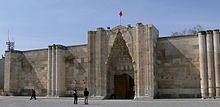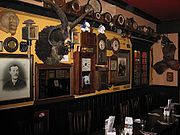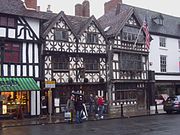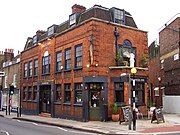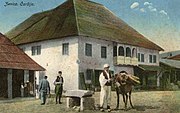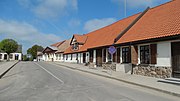
A hotel is an establishment that provides paid lodging on a short-term basis. Facilities provided inside a hotel room may range from a modest-quality mattress in a small room to large suites with bigger, higher-quality beds, a dresser, a refrigerator, and other kitchen facilities, upholstered chairs, a television, and en-suite bathrooms. Small, lower-priced hotels may offer only the most basic guest services and facilities. Larger, higher-priced hotels may provide additional guest facilities such as a swimming pool, a business center with computers, printers, and other office equipment, childcare, conference and event facilities, tennis or basketball courts, gymnasium, restaurants, day spa, and social function services. Hotel rooms are usually numbered to allow guests to identify their room. Some boutique, high-end hotels have custom decorated rooms. Some hotels offer meals as part of a room and board arrangement. In Japan, capsule hotels provide a tiny room suitable only for sleeping and shared bathroom facilities.

A motel, also known as a motor hotel, motor inn or motor lodge, is a hotel designed for motorists, usually having each room entered directly from the parking area for motor vehicles rather than through a central lobby. Entering dictionaries after World War II, the word motel, coined as a portmanteau of "motor hotel", originates from the defunct motel named Milestone Mo-Tel in San Luis Obispo, California, which was built in 1925. The term referred to a type of hotel consisting of a single building of connected rooms whose doors faced a parking lot and in some circumstances, a common area or a series of small cabins with common parking. Motels are often individually owned, though motel chains do exist.

A pub is in several countries a drinking establishment licensed to serve alcoholic drinks for consumption on the premises. The term first appeared in England in the late 17th century, to differentiate private houses from those open to the public as alehouses, taverns and inns. Today, there is no strict definition, but CAMRA states a pub has four characteristics:
- is open to the public without membership or residency
- serves draught beer or cider without requiring food be consumed
- has at least one indoor area not laid out for meals
- allows drinks to be bought at a bar
Heart of Atlanta Motel, Inc. v. United States, 379 U.S. 241 (1964), was a landmark decision of the Supreme Court of the United States holding that the Commerce Clause gave the U.S. Congress power to force private businesses to abide by Title II of the Civil Rights Act of 1964, which prohibits discrimination on the basis of race, religion, or national origin in public accommodations.
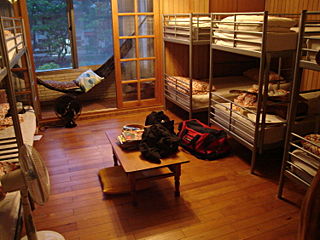
A hostel is a form of low-cost, short-term shared sociable lodging where guests can rent a bed, usually a bunk bed in a dormitory sleeping 4–20 people, with shared use of a lounge and usually a kitchen. Rooms can be mixed or single-sex and have private or shared bathrooms. Private rooms may also be available. Hostels are popular forms of lodging for backpackers, however very few impose age limits, so hostels are an option for travellers of all ages and styles. The benefits of hostels include lower costs and opportunities to meet people from different places, find travel partners, and share travel experiences. Some hostels, such as in India or Hostelling International, cater to a niche market of travelers. Different hostels can be known for offering different experiences. For example, one hostel might feature in-house social gatherings such as movie nights or communal dinners, another might feature local tours, one might be known for its parties, and another might have a quieter place to relax in serenity, or be located on the beach. Newer hostels focus on a more trendy design, some of which are on par with boutique hotels. Some may cater to older digital nomads, global nomads, and perpetual travelers who prefer slightly more upmarket private rooms or a quieter atmosphere. Hostels may also differentiate themselves by being environmentally friendly ecohostels. In countries where wages are lower, the cost of staying at a hostel may be similar to staying in a budget hotel.

A tavern is a type of business where people gather to drink alcoholic beverages and be served food such as different types of roast meats and cheese, and where travelers would receive lodging. An inn is a tavern that has a license to put up guests as lodgers. The word derives from the Latin taberna whose original meaning was a shed, workshop, stall, or pub.
Holiday Inn is a chain of hotels based in Atlanta, Georgia and a brand of IHG Hotels & Resorts. The chain was founded in 1952 by Kemmons Wilson (1913–2003), who opened the first location in Memphis, Tennessee. The chain was a division of Bass Brewery from 1988-2000, Six Continents from 2000-03, and IHG Hotels & Resorts since 2003. It operates hotels under the names Holiday Inn, Holiday Inn Express, Holiday Inn Club Vacations, and Holiday Inn Resorts. As of 2018, Holiday Inn has hotels at over 1,100 locations.

Days Inn is a hotel chain headquartered in the United States. It was founded in 1970 by Cecil B. Day, who opened the first location in Tybee Island, Georgia. The brand is now a part of the Wyndham Hotels and Resorts, headquartered in Parsippany, New Jersey, which used to be a part of Cendant. As of December 31, 2023, Days Inn includes 1,501 locations worldwide with 114,216 rooms.

A guest house is a kind of lodging. In some parts of the world, a guest house is a type of inexpensive hotel-like lodging. In others, it is a private home that has been converted for the exclusive use of visitor accommodation. The owner usually lives in an entirely separate area within the property and the guest house may be as a form of lodging business.
InterContinental Hotels Group (IHG), marketed as IHG Hotels & Resorts, is a British multinational hospitality company headquartered in Windsor, Berkshire, England. It is listed on the London Stock Exchange and the New York Stock Exchange. It is also a constituent of the FTSE 100 Index.

The coaching inn was a vital part of Europe's inland transport infrastructure until the development of the railway, providing a resting point (layover) for people and horses. The inn served the needs of travellers, for food, drink, and rest. The attached stables, staffed by hostlers, cared for the horses, including changing a tired team for a fresh one. Coaching inns were used by private travellers in their coaches, the public riding stagecoaches between one town and another, and the mail coach. Just as with roadhouses in other countries, although many survive, and some still offer overnight accommodation, in general coaching inns have lost their original function and now operate as ordinary pubs.
Ramada is a large American multinational hotel chain owned by Wyndham Hotels & Resorts. As of December 31, 2022, it operates 851 hotels with 120,344 rooms across 63 countries under the Ramada brand.

The hospitality industry is a broad category of fields within the service industry that includes lodging, food and beverage services, event planning, theme parks, travel agency, tourism, hotels, restaurants, nightclubs, and bars.
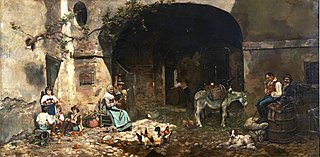
A parador, in Spain and other Spanish-speaking countries was an establishment where travelers could seek lodging, and usually, food and drink, similar to an inn. In Spain since 1928, a Parador is a state-owned luxury hotel, usually located in a converted historic building such as a monastery or castle, or in a modern building in a nature area with a special appeal or with a panoramic view of a historic and monumental city.
Premier Inn Limited is a British limited service hotel chain and the UK's largest hotel brand, with more than 800 hotels, with over 72,000 rooms. It operates hotels in a variety of locations including city centres, suburbs and airports, competing with the likes of Travelodge and Ibis hotels. The company was established by Whitbread as Travel Inn in 1987, to compete with Travelodge. Whitbread bought Premier Lodge in July 2004 and merged it with Travel Inn to form the current business under the name Premier Travel Inn, which was then shortened to the current name in October 2007. Premier Inn accounts for 70% of Whitbread's earnings.
A hotel tax or lodging tax is charged in most of the United States, to travelers when they rent accommodations in a hotel, inn, tourist home or house, motel, or other lodging, generally unless the stay is for a period of 30 days or more. In addition to sales tax, it is collected when payment is made for the accommodation, and it is then remitted by the lodging operator to the city or county. It can also be called hotel occupancy tax in places like New York City and Texas. Despite its name, it generally applies to the same range of accommodations.

A roadhouse or stopping house (Canada) is a small mixed-use premises typically built on or near a major road in a sparsely populated area or an isolated desert region that serves passing travellers, providing food, drinks, accommodation, fuel, and parking spaces to the guests and their vehicles. The premises generally consist of just a single dwelling, permanently occupied by a nuclear family, usually between two and five family members.

A drinking establishment is a business whose primary function is the serving of alcoholic beverages for consumption on the premises. Some establishments may also serve food, or have entertainment, but their main purpose is to serve alcoholic beverages. There are different types of drinking establishment ranging from seedy bars or nightclubs, sometimes termed "dive bars", to 5,000 seat beer halls and elegant places of entertainment for the elite. A public house, informally known as a "pub", is an establishment licensed to serve alcoholic drinks for consumption on the premises in countries and regions of British influence. Although the terms are increasingly used to refer to the same thing, there is a difference between pubs, bars, inns, taverns and lounges where alcohol is served commercially. A tavern or pot-house is, loosely, a place of business where people gather to drink alcoholic beverages and, more than likely, also be served food, though not licensed to put up guests. The word derives from the Latin taberna and the Greek ταβέρνα/taverna.
The Susse Chalet brand was a chain of franchise hotels with all locations in the United States in the Northeast and mid-Atlantic states. Hotels featured free local calls, dataports, expanded cable television, and continental breakfast. Most properties offered meeting facilities and swimming pool. The chain was sold in 2000 and the brand phased out shortly after.



